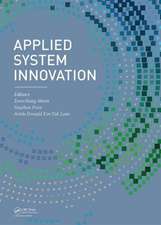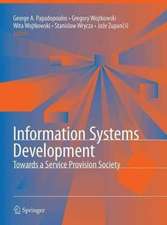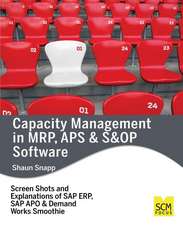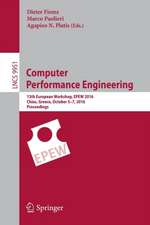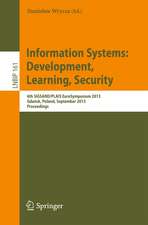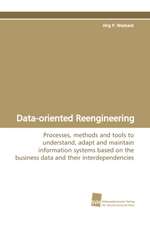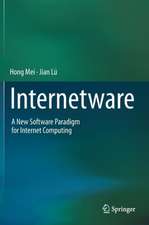Contemporary Trends in Systems Development
Editat de Maung K. Sein, Bjørn-Erik Munkvold, Tore U. Ørvik, Wita Wojtkowski, W. Gregory Wojtkowski, Joze Zupancic, Stanislaw Wryczaen Limba Engleză Paperback – 23 oct 2012
| Toate formatele și edițiile | Preț | Express |
|---|---|---|
| Paperback (1) | 1279.20 lei 6-8 săpt. | |
| Springer Us – 23 oct 2012 | 1279.20 lei 6-8 săpt. | |
| Hardback (1) | 1292.72 lei 6-8 săpt. | |
| Springer Us – 30 sep 2001 | 1292.72 lei 6-8 săpt. |
Preț: 1279.20 lei
Preț vechi: 1599.00 lei
-20% Nou
Puncte Express: 1919
Preț estimativ în valută:
244.85€ • 257.24$ • 205.77£
244.85€ • 257.24$ • 205.77£
Carte tipărită la comandă
Livrare economică 11-25 martie
Preluare comenzi: 021 569.72.76
Specificații
ISBN-13: 9781461355069
ISBN-10: 1461355060
Pagini: 452
Ilustrații: XIII, 433 p.
Dimensiuni: 155 x 235 x 24 mm
Greutate: 0.63 kg
Ediția:Softcover reprint of the original 1st ed. 2001
Editura: Springer Us
Colecția Springer
Locul publicării:New York, NY, United States
ISBN-10: 1461355060
Pagini: 452
Ilustrații: XIII, 433 p.
Dimensiuni: 155 x 235 x 24 mm
Greutate: 0.63 kg
Ediția:Softcover reprint of the original 1st ed. 2001
Editura: Springer Us
Colecția Springer
Locul publicării:New York, NY, United States
Public țintă
ResearchCuprins
Section 1: Perspectives on information systems developement.- 1. The Machine Is Not the Woman: Cyberfeminism and the Techno- Determinism of Information Systems.- 2. To Err Is Human: Implications for Information Systems Development.- 3. CRISP: The Campaign for Real Information Systems Production.- 4. Methodological Rigour and Methodology Relevance in IS Development.- Section 2: Information systems development methods.- 5. The Impact of Reference Modeling in MRPII/ERP Systems on Business Process Reengineering.- 6. A Maturity Framework for the Enterprise Modeling and Engineering Process.- 7. Development Methods for Knowledge Intensive Applications.- 8. Framework Oriented Software Development and Its Challenges: Commercial Software Solutions Provider Perspective.- 9. Are Use Cases Necessarily the Best Start of an OO System Development Process?.- Section 3: Information systems development tools, techniques and technologies.- 10. Using Hierarchies to Adapt Domain Analysis to Software Development.- 11. A Mobility Prediction Handover Algorithm for Quality of Service Improvement in Wireless ATM.- 12. FTI Algorithm for Component Interface Meta Modeling of the TMN Agents.- 13. XML: A Challenge for Databases?.- 14. Process Diagram Technique for Business Processes Modeling.- 15. Artificial Neural Networks in Predicting a Dichotomous Level of Financial Distress for Uneven Training and Testing Samples.- Section 4: Management of information systems and systems development.- 16. Managing Software Development within a Virtual Project Environment.- 17. Managerial Enterprise Structural Stakeholders (MESS) Model— Modelling the Influence of Organisational Politics and Structure Upon Cost of Systems Development.- 18. Development Recommendations for Knowledge Management/ OrganizationalMemory Systems.- 19. An Integrated Object & Fuzzy Cognitive Maps Approach to Business Process Management.- 20. An Empirical Assessment of IT Disaster Probabilities.- 21. Knowledge Management: Trusting Knowledge Workers.- 22. Information Systems Audit for Investment Decision.- Section 5: Information systems application areas.- 23. Implementation of an Integrated Software Package.- 24. Matchmaking Mechanisms for Agent-Mediated Electronic Markets.- 25. Implementing Enterprise Resource Planning Systems: Implications for Financial Specialists.- 26. A Model for Organisational Integration of Meeting Outcomes.- 27. Decision Support Systems Implementation Research: Review of the Current State and Future Directions.- 28. WWW Workflows Based on Petri Nets.- 29. Information Technology in the Marketing Mix of a Modern Business.- 30. Manningham On-Line—Using Global Technologies for Building Local Electronic Commerce Business.- Section 6: Information systems education and learning.- 31. Maintaining Software May Help an Organization Learn: Applying Organizational Learning to Software Enhancement.- 32. Object Based Learning Systems (OBL): A Virtual Context for Embedding Artificial Intelligence in Tutorial Software.- 33. Teaching XML in a Business School: Lessons Learned from the Agder Experience.- 34. Projects as Learning Environments: A Case Study in IS Education.


